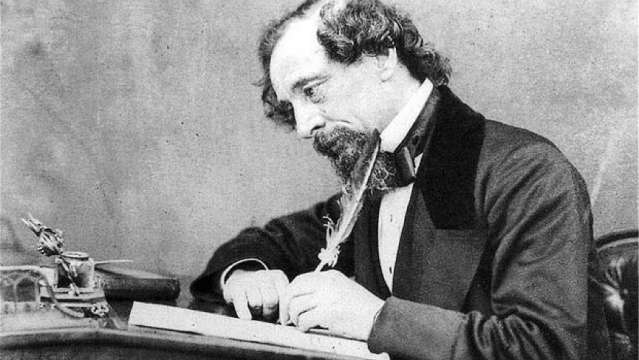Julian Gough, Irish novelist, memoirist, poet and playwright, gives densely packed advice in his essay How To Edit Your Own Lousy Writing. He explains the “job” that a first, second and third draft each do, editing a hypothetical scene as a concrete example.
Charles Dickens, first-drafter
Gough gives several tips that are worth hanging on a poster above your computer, especially if you’ve just started National Novel Writing Month. My favourite is: “Don’t fix commas when the plot is broken.” Eleven years into my writing career, I still indulge this bad habit with every long project, wasting hours tweaking witty dialogue that will all be deleted when I entirely replace act three.
Of course, some amount of comma-fixing is inevitable; sometimes you have to finesse a passage for days before you realise that you’re trying to salvage the unsalvageable. But too much of it can be demoralising, and stand in the way of you ever finishing your work. At the very least, try not to edit your first draft until you’ve roughly gotten it all out, start to finish.
Similarly, Gough says, don’t stress over character names or factoids in the early drafts. Don’t screech to a halt and crack open Baby Name Voyager or Wikipedia. That’s not research, that’s procrastination. Throw in a placeholder and keep up your momentum:
I write first drafts that are full of typos and holes. And when I say holes, I mean actual gaps, where I might note ‘fix this problem later’ or ‘blah blah blah’ for a conversation that I don’t feel like imagining yet. Also, I usually start writing now with no idea what anyone is called, so I just type ‘&&&&&&’ where the names should be. (I’m writing these characters into existence – it’s easier to name them later when I know who they are.)
You can, by the way, start anywhere. For instance, I have trouble writing intros for blog posts. I’ve learned to start with any obvious piece of information that the article needs to include. That leads to the second piece, and so on. Once the actual post is written, it’s a lot easier to introduce it. Half the time I realise I don’t need any throat-clearing up top – this is a blog post, not a book.
I’m still bad at conclusions.
How to Edit Your Own Lousy Writing [The Stinging Fly]

Comments